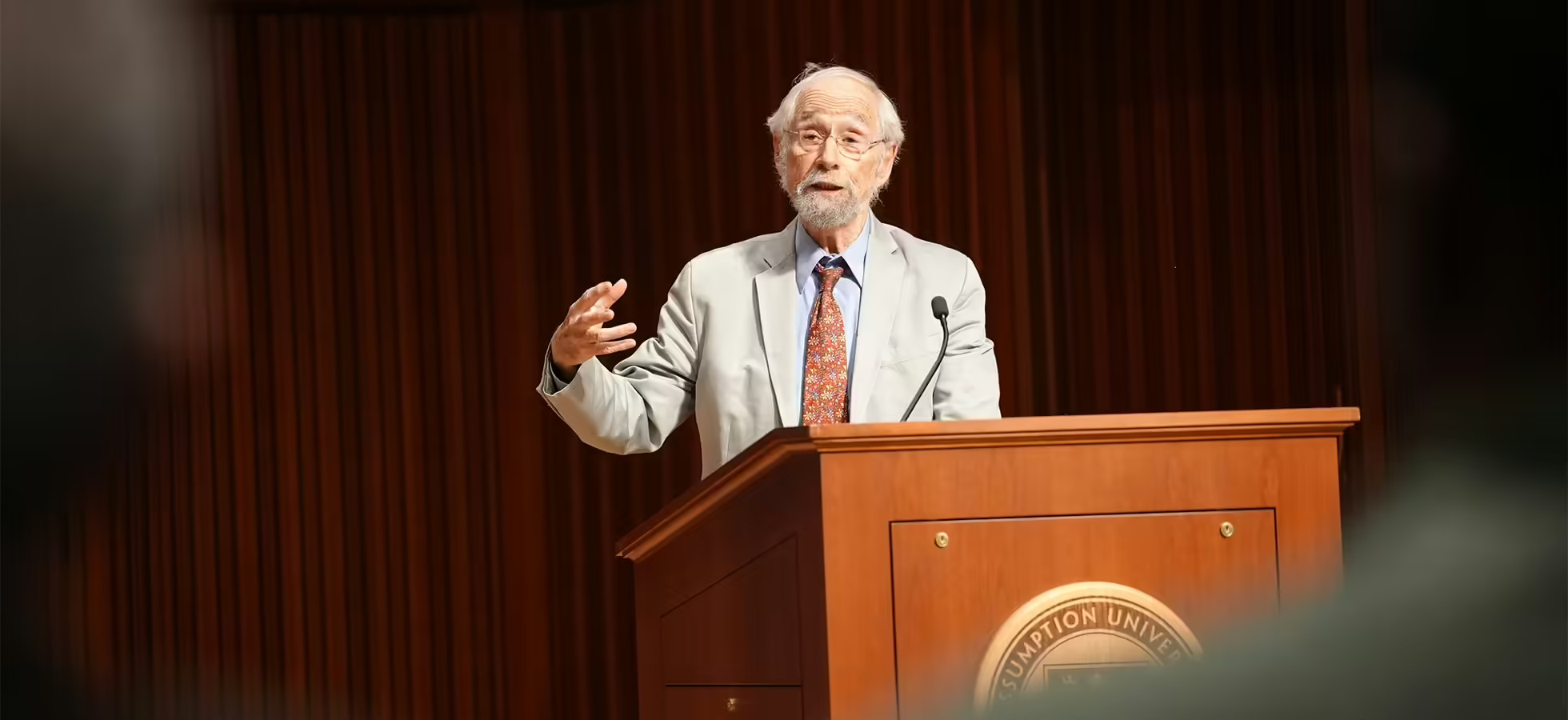Center for Civic Friendship Hosts Inaugural Event Featuring Panelists from New England Colleges

On November 7, in the wake of the 2024 presidential election, Assumption University’s Center for Civic Friendship hosted its inaugural event, a panel discussion titled “The Prospects for Civic Friendship Today”. The participants examined the challenges and imperatives to civil discourse in the wake of the election, the intensification of political protest, growing uncertainty regarding higher education, and other anxieties.
The panel featured scholars from four New England colleges, including Greg Weiner, President of Assumption University; Holly Taylor Coolman, Assistant Professor of Theology at Providence College; Corinne Gartner, Associate Professor of Philosophy at Wellesley College; and Marc Landy, Professor of Political Science at Boston College. Christopher Gilbert, Associate Professor of English at Assumption served as the respondent and moderated questions.
Mary Jane Rein, the Director of the Center for Civic Friendship, welcomed an audience of students, faculty, alumni, and friends and described how she is already seeing the mission of the center lived out on Assumption’s campus, highlighting two undergraduates who were able to discuss the election in the context of their cherished friendship despite voting differently.
“The center may be in its infancy, but these undergraduates already have the habits of mind that portend its success,” said Rein. “Civic friendship is a commitment to seeing fellow citizens as partners in a shared community, fostering mutual respect, trust, and a dedication to the common good, even amid differences.”
In addition to her remarks, Rein announced plans to recruit an inaugural cohort of 10 Civic Friendship Scholars for fall 2024. This brand-new scholarship will offer students the opportunity to participate in building the Center for Civic Friendship by participating in programmatic initiatives, cultivating meaningful relationships, and developing their capacity for respectful discourse. Scholars will receive a $10,000 housing scholarship and a $500 book stipend.
“Assumption is dedicated to promoting civility, open debate and free expression, but also deep engagement with ideas pursued in the company of friends. We aim to cultivate in students the ability to face our differences with care for each other. Friendship is the key ingredient to making such conversations not only possible, but truly productive,” she said.
Each of the panelists delivered remarks that provided key insights into how to understand civic friendship from the perspective of their respective areas of study, including political science, philosophy, theology, and rhetoric. Weiner spoke first, discussing how civic friendship seeks to establish commonality with others despite not always being in agreement.
“Civic friendship requires civil dialogue, but also situates it in a context of common purpose that can make civic engagement, including our disagreements, not only polite, but also productive,” said Weiner. “Civic friendship provides a foundation of mutual trust that makes the natural disagreements of political life productive. Civic friendship, then, is a condition in which citizens share basic commitments to the same object of their love.”
Gartner focused her remarks on Aristotle’s definitions of friendship, as this has been the basis for much of her scholarly work. She described how engaging in civic friendship is important for the community, as engaging with civic friends helps build knowledge, improves thinking skills, and advances the understanding of truth.
Coolman discussed how political polarization has led some supporters of partisan political views to treat their political ideas as religious beliefs. To combat the polarization in America today, Coolman suggested following a model of interreligious dialogue: attempting to build friendship and find common ground with one another and then listening meaningfully to the beliefs shared.
Landy discussed civic friendship as it relates to college campus communities. He noted that civility is a prerequisite for civic friendship, and both are required to build community, both in everyday life and as they relate to college campuses.
“This kind of friendship is as vital to decent civic life on a college campus as it is in a neighborhood,” Landy said. “Citizenship builds on civic friendship. It is a muscle. It must be exercised to stay in shape.”
“Friendship is work. We have to work at it. We have to want it. We have to listen to each other as a culture, never mind as a body politic,” Gilbert observed in his remarks before moderating the question-and-answer discussion. “It seems to me, then, that a crucial matter of concern for us does have to do with civility, which is not to say just being nice or respectful, but rather striving to embody, if not love of, then at the very least care for, something bigger or beyond ourselves, beyond others, seemingly like us, beyond the immediate company.”
The panel invited the audience to comment, taking questions about the relationship between truth and friendship and what students should do when they are unsure about the friendships they have developed.
“There’s a lot of civic friendship out there,” said Landy. “It’s happening. Think about your own communities where you live, and all the people who are engaged in various civic activities. It’s really very widespread – not as widespread as it needs to be, but I think we should appreciate our country in that, in that respect, there’s a lot to build on.”
The event concluded with a sense of hope about the possibility for fostering civic friendship, certainly at Assumption University, but also beyond campus in the communities in which we live and hope to thrive together.
To learn more about the Center for Civic Friendship, visit the Center webpage.
